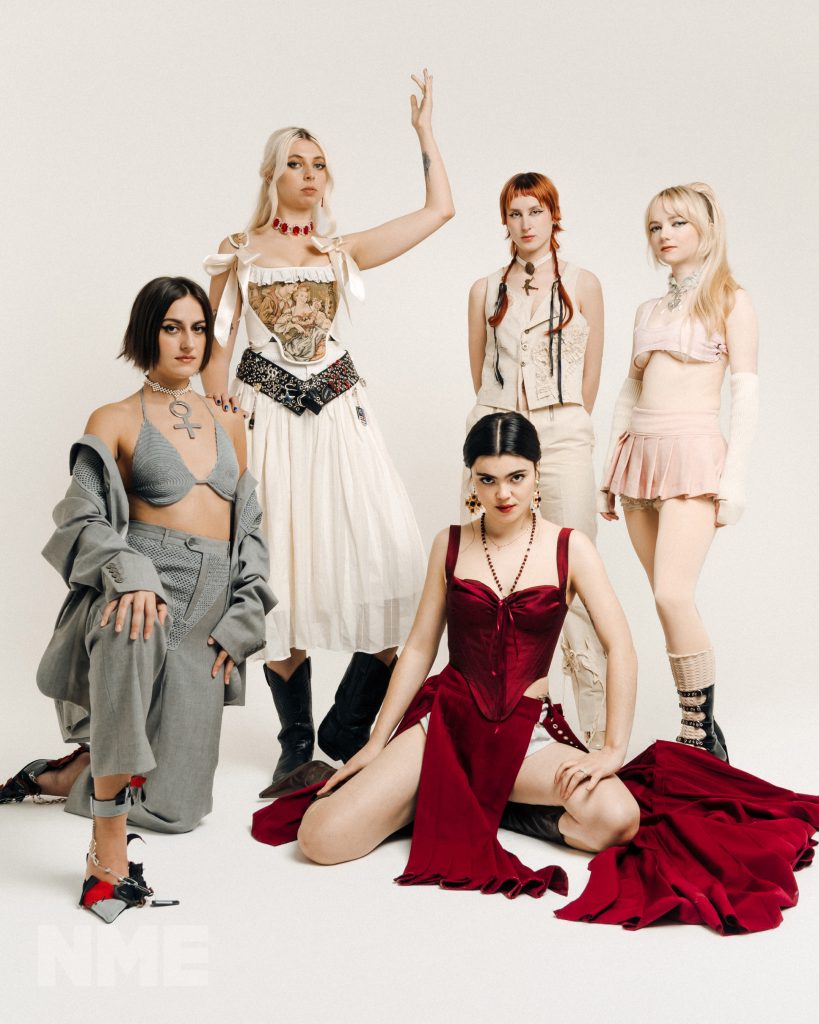Clairo, Wet Leg, Billie Eilish, and now The Last Dinner Party. What do these celebrated, female-fronted music acts have in common? Each act was veritably ripped to shreds online, carelessly branded “industry plants” upon climactic ascents to stardom. In a cruel dismissal of the adversities female artists must overcome to succeed in a male-dominated field, these artists were therefore accused of relying on nepotism or inherited wealth to break into the music industry.
Formed in 2020, The Last Dinner Party is the latest to join a growing roster of artists whose success came so suddenly and monumentally, the public could not accept the non-existence of a fat inheritance, a well-connected uncle. And sure, with the enormous success and virality of the 5-piece’s debut single, “Nothing Matters,” in April 2023, it was hard to believe a preliminary recorded effort could be so well-received, so well-produced and fleshed out. However, what keyboard gremlins failed to note was the unconventional approach taken by Abigail Morris, Lizzie Mayland, Georgia Davies, Emily Roberts, and Aurora Nishevci, who collectively agreed to prioritize perfecting the band’s stage presence over rushing into a recording studio. Having formed in 2019, the band waited thee years, until Covid restrictions had lifted, before delving into the performance sphere in 2021. In an interview with Rolling Stone, frontwoman Abigail Morris explained, “It meant we had so much time to really come out fully formed.”






Word of the band’s theatrical, flamboyant performances traversed the London underground, motivating youtuber Lou Smith to attend the band’s fourth-ever gig. Perhaps it was Morris’ exhilarating stage presence that found her writhing in the midst of a sweaty crowd, or the young band’s cohesive sound and fully-formed medieval aesthetic, but a Youtube video of the gig later uploaded by Smith would attract the attention of Island Recordings UK. The Last Dinner Party was signed to Island Recordings in 2023, their rapid ascent to success thereafter inevitable; the band was backed by a label who’s president, Louis Bloom, compared the “quirky” British act to the likes of Kate Bush, Queen, and Bowie in an interview with Variety.
The Last Dinner Party’s debut baroque pop album, Prelude to Ecstasy, puts a sapphic spin on the medieval, a brazen retelling of modern femininity through post-punk gothic synths, glammy guitar leads, and eclectically-Renaissance lyricism á la Florence and the Machine.
The operatic “Prelude to Ecstasy,” opens with a timid flute, birdlike as flitting trills coalesce into a grandiose crescendo, crashing cymbals confronted by singing violins. A glittering harp juxtaposes mounting intensity as the listener is plunged into The Last Dinner Party’s medieval microcosm. It’s an entrance fit for a queen.
“Prelude to Ecstasy’s” orchestral constituents are seamlessly transformed into electronic synths, marking the arrival of “Burn Alive.” Home to the strongest post-punk sound on the record, “Burn Alive’s” sound verges on harrowingly gothic with Morris indulging in the archetypal imagery of renewal birthed from flames: “let me make my grief a commodity” she sings, “burn me alive.” As the singer fervently unleashes the cry, “burn me,” the apex of her voice is somehow both guttural and crystalline, her bandmates’ chanting filling the rhythm’s negative space as Morris continues to pave her own rhythmic path.
“Nothing matters” starts at a whisper, lulling harp chords and gentle twangs from Roberts’ guitar a canvas for Morris’ pretty enunciations. The illusion of tranquility is progressively shattered, first by the introduction of a rigid cymbal and then all at once as Morris explodes into the first chorus: “And you can hold me like he held her/ And I will fuck you like nothing matters.” In an undeniably glam-inspired climax, a robust guitar solo from Roberts acts as a precursor to Morris’ satisfyingly elongated bellow on “matters.” Undeniably the album’s greatest, catchiest triumph, “Nothing Matters” is a fantastically balanced cut: a slow burn that finds equilibrium in an amalgamation of choppy, explosive, and soft sounds.
“Caesar on a TV Screen” marks a brief departure from the overtly-baroque, yet Morris’ punctual lyricism pining for Caesar’s venerability introduces one of the album’s most prominent themes: frustration with femininity. Morris pines for an empowerment bestowed upon even the most despotic of men as the song’s melodies mirror the dichotomous nature of a quest for self worth. Subdued ruminations on life with a respected disposition (to be a man) are bridged by a bright disco-pop breakdown, lyrics “And just for a second, I could be one of the greats,” evincing newfound conviction. Colorful and unexpected, the cut feels like watching a Mime change expression with the swipe of an artificially-whitened hand, one second a disconcertedly wide grin, the next a dejectedly downturned pout.
Thematically, “Beautiful boy” walks an avenue reminiscent of “Caesar on a TV Screen,” shipwreck imagery transposed by Morris’ gently escalating supplications, “I wish I could be a beautiful boy.” Morris, who wrote the song, told WXPN that the song is about “what it’s like to walk through life with the specific type of privilege of being just a beautiful man. A beautiful woman is one kind of privilege, but that comes with its own horrors and unfortunate things and fears.”
Taken together, the lyricism on “Beautiful Boy” and “Caesar on a TV Screen” work in tandem: masquerading as pleasant pop ballads, the cuts fracture that illusion with lyricism harping on the systematic disempowerment of women. It is an evocative theme on an album aesthetically inspired by an era where a patriarchy reigned supreme over a prostrated matriarchy. However, what these dual poppy cuts lack is a certain grittiness, a certain risk taking, that leaves something to be desired in the context of an album devoted to externalizing feminine rage.
Prelude to Ecstasy is massively successful as a debut, as much a period piece as a fourth-wave feminist dissertation. At times, overwhelmingly pop sonic qualities clash with lyrical norm transgressions, yet the album ultimately triumphs in its polished sonic qualities, catchy hooks, and punchy lyrics. The band managed to put their own spin on popular music in Prelude to Ecstasy, imbuing their lyrics with a meaning atypical of a genre so flagrantly dismissed as soulless. While still green, The Last Dinner Party is undoubtedly one to watch.


Listen to Prelude to Ecstasy here:




